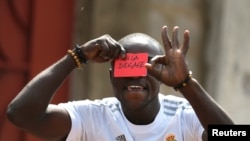Military and police deployed across Congo's capital on Monday amid fears of unrest on the last official day of President Joseph Kabila's mandate. He intends to stay on after the midnight deadline; a court has ruled he can remain in power until new elections, now postponed indefinitely, are held.
Anger has been growing since it became clear that the vote once set for November would not take place on time. Political talks between the ruling party and the opposition, mediated by the Catholic church, stalled over the weekend and are set to resume Wednesday.
The opposition has not officially called for demonstrations, though many observers expect Kabila's opponents to take to the streets as they did when the electoral commission failed to call the election. Human rights groups say more than 50 people died in the September unrest.
"We can't demonstrate because of the police. They are patrolling and searching people," said Jean Eva, an unemployed young man talking with his friends. "Tonight it's the end of Kabila's mandate. At midnight, we are going to whistle to mark the end of the match. We'll whistle from our homes, in front of our doors. Lots of people got whistles."
The lack of an agreement in the Catholic-mediated talks raised fears of potential violence in this sprawling central African nation that has suffered decades of dictatorship and back-to-back civil wars.
Opposition leader Felix Tshisekedi has said that new elections "must be held and can be held in 2017," despite calls from the presidential majority to hold them in April 2018. Congolese officials have said more time is needed to update voter rolls and make other preparations.
Kabila came to power in 2001 after the assassination of his father. Some observers fear that tensions over his continued rule could again unleash fighting in the mineral-rich country.
U.N. High Commissioner for Human Rights Zeid Ra'ad Al Hussein said Saturday that concerns about unrest are high, especially since "no one to date has been held accountable" for the protesters' deaths in September.
"We call on the government, and especially its security forces, to take all necessary measures to guarantee the rights to freedom of association and of peaceful assembly," he said.




